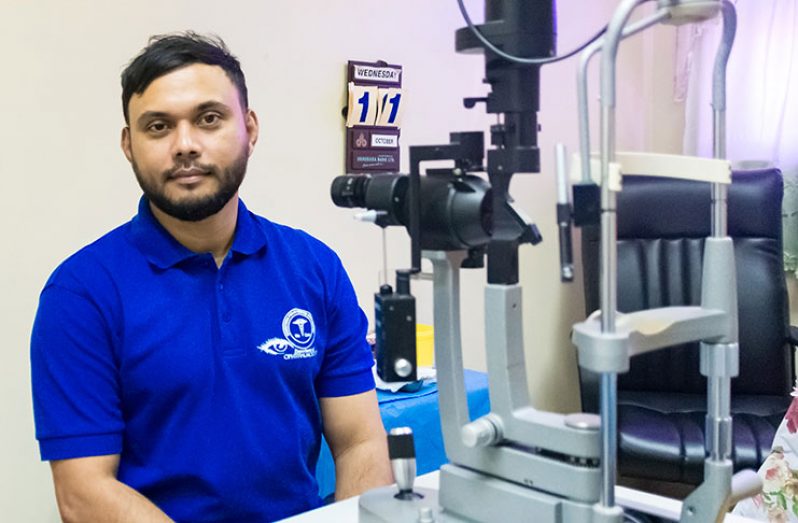– these are coming from companies that sell generic drugs, says Dr Sugrim
MANY people have either died or fallen ill, not because of a medical condition, but in some instances because of substandard and falsified drugs which continue to find their way into the global and local markets.
Falsified and substandard medications are from those companies that sell generic drugs, which are not made to the intended quality or concentrations, said Head of the Georgetown Public Hospital Corporation (GPHC)’s Ophthalmology Department, Dr Shailendra Sugrim.
“This would cause confusion in the consumers’ minds on generics in general. There are quite a few reliable companies who make generic drugs to good quality using certain mechanisms to cut their cost of production. Whenever substandard or falsified medications appear on the market, then the consumer will usually think twice before purchasing a generic,” said Sugrim in an invited comment.
Although such drugs have been found on the local market, Sugrim said he has not encountered many substandard and falsified drugs in eye care.
When they get into the market, those medical products cause harm to patients and fail to treat the diseases for which they were intended.
According to Sugrim, those drugs affect healthcare delivery in many ways. It has a non-therapeutic effect, which means that the patient does not receive the therapeutic or curative effect that they were intended to have.
After not receiving the desired result, patients may lose confidence in the medical profession and the pharmaceutical industry.
“Substandard drugs can also have untoward side-effects, since we’re not sure of the standard under which they were manufactured,” Sugrim lamented.
Falsified and substandard drugs also worsen the condition of persons, because they do not get the correct therapeutic effect of the correct medication.
With all the damning effects, it is necessary to take precautions when purchasing drugs. Sugrim said his department would usually receive either brand or generic medications.
From his experience, most of the generics they use for eye medications work fairly well, but there are added benefits of brand-name drugs.
The branded drugs have reliable scientific research and rigid-testing mechanisms behind the use of the drug.
Branded drugs are usually not within the budget of the common man, so generics are quite a good, affordable alternative for patients.
According to the World Health Organisation (WHO), both generic and innovator medicines can be falsified, ranging from very expensive products for cancer to very inexpensive products for treatment of pain.
They can be found in illegal street markets, via unregulated websites through to pharmacies, clinics and hospitals.
WHO statistics show that an estimated one in 10 medical products in low- and middle-income countries are substandard or falsified.
In 2013, the WHO launched the Global Surveillance and Monitoring System to encourage countries to report incidents of substandard and falsified medical products in a structured and systematic format, to help develop a more accurate and validated assessment of the problem.
As of November 2017, WHO had issued 20 global medical product alerts and numerous regional warnings, and has provided technical support in over 100 cases.
“We know for sure that there are substandard or unregistered pharmaceuticals in our market, we have had cause to go to court for some defaulters,” said Director of the Government Analyst, Food and Drug Department (GA-FDD), Marlon Cole.
ASSESSMENT
In order to ascertain the exact impact of falsified and substandard drugs in Guyana, the GA-FDD has embarked on an exercise to do an assessment of the medical industry.
Cole said the department is working with the Regional Medicine Surveillance Department in Jamaica to do the assessment.
GA-FDD has since sent two batches of samples to the surveillance department for testing. The department is also using its local capacity through the Drug Chemistry Lab to do some analyses.
“We are responding because there has been a plethora of complaints about people saying the drug is not doing what it should,” Cole lamented.
He recalled that he had personal experiences where friends of his went to an institution to be treated and it was too late, because they did not realise the medication was not working.

Cole believes falsified and substandard drugs are a burden to the healthcare delivery system, so healthcare agencies have to be more vigilant and detect those things.
The best known way to deal with those medications is to develop systems to detect them. He said they have to first check to see if the product is registered and work from there.
According to Cole, there is a global surveillance monitoring system which gives users information in real time.
“We can enter and send information if we discover a substandard item in Guyana…We can load it and the entire globe will know the specific name of the medication, who is the trader and which factory it came from,” said the GA-FDD director.
The system was launched in 2013 and by 2017, it had received 2000 reports of substandard drugs globally.
Reporting was not limited to any specific drug, but was predominant among lifestyle medication such as things for weight loss.
Guyana has also signed on to the Caribbean Drug Registration Systems. This system determines which drugs are sold in Canada, the United States of America, Australia and the United Kingdom (UK).
“If the drug is permitted to be sold there, the drug must be issued with a certificate of authorisation to be sold in those countries,” Cole explained.
The system, he said, was not adhered to in the past, but they have been enforcing it; so now even if a drug is manufactured in India, Pakistan or China it must show authorisation from one of the aforementioned countries.
“To combat this you need good governance…you need the technical capacity…our response in some cases is to go to court, refuse entry, seize or confiscate falsified and substandard drugs,” said Cole.
In order to maintain their effort, he said the GA-FDD needs the support of the Pharmacy Council of Guyana and the Poison Board.




.png)









